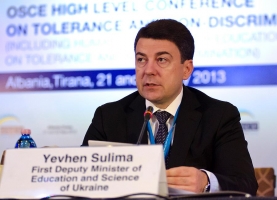High-level OSCE conference in Tirana calls for comprehensive approach to combating intolerance and discrimination
A comprehensive approach, including education to promote mutual respect and understanding, is necessary to combat intolerance and discrimination, including hate crime, participants said Tuesday at the opening of a two-day OSCE conference in Tirana.

Ukraine's First Deputy Minister of Education and Science, Yevhen Sulima, speaking at the opening of a high-level OSCE conference on tolerance and non-discrimination in Tirana, Albania, 21 May 2013.
The OSCE conference, organized by the Ukrainian OSCE Chairmanship, brought together representatives of governments and civil society organizations focusing on issues of tolerance and non-discrimination from the Organization’s 57 participating States and its Partners for Co-operation.
In his welcoming statement, Albanian Prime Minister Sali Berisha, told the conference that his country is committed to interfaith harmony and tolerance, which he described as the founding values of Albanian society.
“Those who struggle must be prepared for a long and serious fight based on values,” Berisha said.
Special attention was to be paid at the conference to the importance of human rights education in addressing intolerance and discrimination, as well as the roles of political leadership, legislation, law enforcement, data collection and civil society.
Yevhen Sulima, the Ukrainian First Deputy Minister of Education and Science, reminded the conference that the promotion of tolerance and non-discrimination through education is a priority for the Ukrainian OSCE Chairmanship.
“One of the most important themes of this event, one on which all of the participants will be focusing their attention, is the role of human rights education for young people in strengthening of mutual understanding and respect for diversity,” Sulima said. “In Ljubljana in 2005, all participating States of OSCE committed to encouraging public and private educational programmes that promote tolerance and non-discrimination, and raising public awareness of the existence and unacceptability of intolerance and discrimination.”
Douglas Wake, the First Deputy Director of the OSCE Office for Democratic Institutions and Human Rights (ODIHR), the OSCE institution actively engaged in the areas of tolerance and non-discrimination, spoke of the positive results of the OSCE’s work in this area, while stressing that much remained to be done.
“No participating State is immune to hate-motivated crimes and incidents. Bias and prejudice exist in one form or another everywhere,” Wake said. “This means that it is definitely our collective responsibility to prevent and respond to manifestations of intolerance.”
Among the commitments participating States have made are those to combat intolerance and discrimination, including racism, xenophobia, aggressive nationalism and anti-Semitism, as well as discrimination against Muslims, Christians and members of other religions, and Roma.
Source: Organization for Security and Co-operation in Europe
- 419 reads
Human Rights
Fostering a More Humane World: The 28th Eurasian Economic Summi

Conscience, Hope, and Action: Keys to Global Peace and Sustainability

Ringing FOWPAL’s Peace Bell for the World:Nobel Peace Prize Laureates’ Visions and Actions

Protecting the World’s Cultural Diversity for a Sustainable Future

Puppet Show I International Friendship Day 2020

